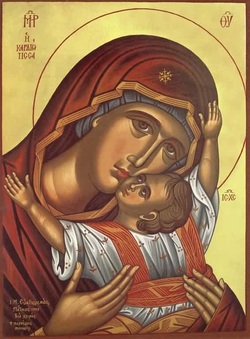
Mary
From the Orthodox Study Bible:
“For behold, all generations will call me blessed.” (Luke 1:48)
For two thousand years the Church has preserved the memory of the Virgin Mary as the prototype of all Christians-the model of what we are to become in Christ. Mary was truly pure and unconditionally obedient to God. The tradition of the Church holds that Mary remained a virgin all her life (see note on Matt. 12:46-50). While lifelong celibacy is not a model for all Christians to follow, Mary’s spiritual purity, her wholehearted devotion to God, is certainly to be emulated.
Mary is also our model in that she was the first person to receive Jesus Christ. As Mary bore Christ in her womb physically, all Christians now have the privilege of bearing God within them spiritually. By God’s grace and mercy we are purified and empowered to become like Him.
The honor we give to Mary also signifies our view of who Jesus is. From early times the Church has called her Mother of God (Gr. Theotokos, lit. God-Bearer), a title which implies that her Son is both fully man and fully God. As His mother, Mary was the source of Jesus’ human nature; yet, the One she bore in her womb was also the eternal God.
Therefore, because of her character and especially because of her role in God’s plan of salvation, Christians appropriately honor Mary as the first among the saints. The archangel Gabriel initiated this honor in his address to her: “Rejoice, highly favored one, the Lord is with you; blessed are you among women!” (Luke 1:28). This salutation clearly indicates that God Himself had chosen to honor Mary. Her favored status was confirmed when she went to visit her cousin Elizabeth, who was then six months pregnant with John the Baptist. Elizabeth greeted Mary with these words; “Blessed are you among women, and blessed is the fruit of your womb! But why is this granted to me, that the mother of my Lord should come to me?” (Luke 1:42,43). And Mary herself, by the inspiration of the Holy Spirit, predicted the honor that would be paid her throughout history: “For behold, henceforth all generations will call me blessed” (Luke 1:48).
In obedience to God’s clear intention, therefore, the Orthodox Church honors Mary in icons, hymns, and special feast days. We entreat her, as the human being who was most intimate with Christ on earth, to intercede with her Son on our behalf. We ask her, as the first believer and the mother of the Church, for guidance and protection. We venerate her-but we do not worship her, for worship belongs to God alone.
In Matins, Vespers, and all the services of the hours of prayer, we sing this hymn, which expresses Mary’s unique place in creation.
It is truly right to bless you, O Theotokos, ever-blessed and most pure, and the mother of our God. More honorable than the Cherubim, and more glorious beyond compare than the Seraphim, without defilement you gave birth to God the Word: True Theotokos, we magnify you.
From the Orthodox Study Bible:
“For behold, all generations will call me blessed.” (Luke 1:48)
For two thousand years the Church has preserved the memory of the Virgin Mary as the prototype of all Christians-the model of what we are to become in Christ. Mary was truly pure and unconditionally obedient to God. The tradition of the Church holds that Mary remained a virgin all her life (see note on Matt. 12:46-50). While lifelong celibacy is not a model for all Christians to follow, Mary’s spiritual purity, her wholehearted devotion to God, is certainly to be emulated.
Mary is also our model in that she was the first person to receive Jesus Christ. As Mary bore Christ in her womb physically, all Christians now have the privilege of bearing God within them spiritually. By God’s grace and mercy we are purified and empowered to become like Him.
The honor we give to Mary also signifies our view of who Jesus is. From early times the Church has called her Mother of God (Gr. Theotokos, lit. God-Bearer), a title which implies that her Son is both fully man and fully God. As His mother, Mary was the source of Jesus’ human nature; yet, the One she bore in her womb was also the eternal God.
Therefore, because of her character and especially because of her role in God’s plan of salvation, Christians appropriately honor Mary as the first among the saints. The archangel Gabriel initiated this honor in his address to her: “Rejoice, highly favored one, the Lord is with you; blessed are you among women!” (Luke 1:28). This salutation clearly indicates that God Himself had chosen to honor Mary. Her favored status was confirmed when she went to visit her cousin Elizabeth, who was then six months pregnant with John the Baptist. Elizabeth greeted Mary with these words; “Blessed are you among women, and blessed is the fruit of your womb! But why is this granted to me, that the mother of my Lord should come to me?” (Luke 1:42,43). And Mary herself, by the inspiration of the Holy Spirit, predicted the honor that would be paid her throughout history: “For behold, henceforth all generations will call me blessed” (Luke 1:48).
In obedience to God’s clear intention, therefore, the Orthodox Church honors Mary in icons, hymns, and special feast days. We entreat her, as the human being who was most intimate with Christ on earth, to intercede with her Son on our behalf. We ask her, as the first believer and the mother of the Church, for guidance and protection. We venerate her-but we do not worship her, for worship belongs to God alone.
In Matins, Vespers, and all the services of the hours of prayer, we sing this hymn, which expresses Mary’s unique place in creation.
It is truly right to bless you, O Theotokos, ever-blessed and most pure, and the mother of our God. More honorable than the Cherubim, and more glorious beyond compare than the Seraphim, without defilement you gave birth to God the Word: True Theotokos, we magnify you.
